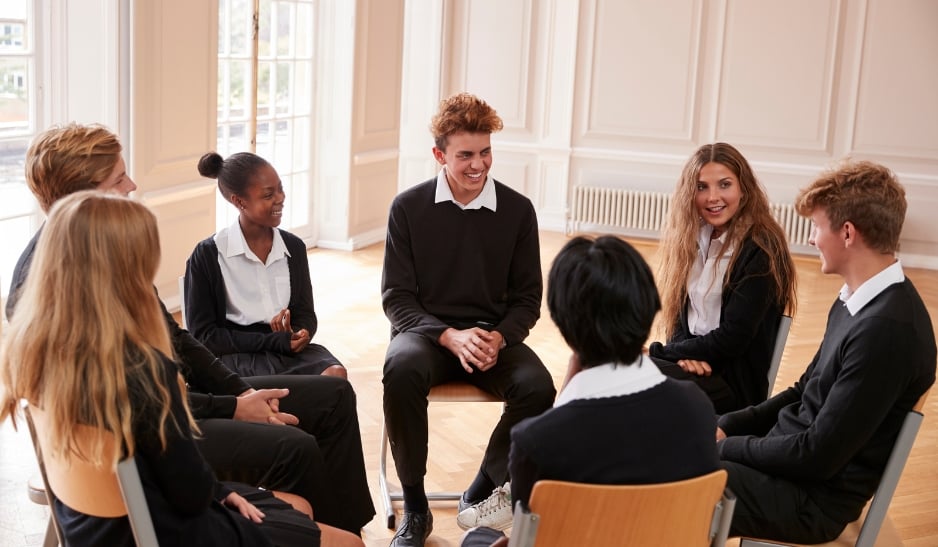Building Leadership Skills: Guide to Afterschool Programs for Teenager

Building Leadership Skills: Guide to Afterschool Programs for Teenager
In today's dynamic and fast-paced world, the significance of leadership skills has grown exponentially. The ability to inspire, motivate, and guide others towards a common goal is highly valued in various spheres of life, including education, career, and community engagement. While leadership skills can be cultivated through various experiences, after-school programs play a vital role in shaping teenagers into effective leaders.
After-school programs provide a unique environment for teenagers to explore their passions, develop new interests, and acquire valuable life skills. These programs offer a diverse range of activities, from academic-focused clubs to arts and culture programs and sports and physical activities. By actively participating in these programs, teenagers have the opportunity to build and enhance their leadership abilities, laying a solid foundation for their future endeavors.
In this guide, we will explore the importance of leadership skills for teenagers and delve into the different after-school programs that can help them develop these crucial qualities. We will examine how teenagers can build leadership skills through academic-focused programs, arts and culture programs, as well as sports and physical activities.
Understanding Leadership Skills
Leadership skills are essential for teenagers as they navigate their journey towards adulthood. These skills empower them to become influential leaders and positively impact their personal and professional lives. Let's explore the key aspects of leadership skills that teenagers should understand:
- Definition and traits
Leadership involves guiding and inspiring others towards common goals. Key traits of a leader include effective communication, decision-making abilities, adaptability, resilience, and collaborative mindset. - Importance for teenagers
Developing leadership skills equips teenagers with the tools to overcome challenges, become responsible citizens, and succeed in future roles. It goes beyond authority and enables them to take initiative, embrace responsibility, and contribute positively to their communities. - Benefits of early development
Cultivating leadership abilities at a young age has numerous advantages. Teenagers become more confident, self-assured individuals who can express themselves effectively. They also enhance critical thinking, problem-solving, and decision-making skills. - Communication and interpersonal relationships
Leadership skills foster effective communication, allowing teenagers to articulate ideas clearly, listen attentively, and build meaningful connections. These skills are vital for personal relationships and professional environments.
In summary, leadership skills are vital for teenagers' personal growth and future success. Understanding the definition, traits, and benefits of leadership skills provides a solid foundation for their development.
How Teenagers Can Build Leadership Skills
To build leadership skills, teenagers can engage in various after-school programs that offer valuable opportunities for growth and development. These programs provide a structured environment where teenagers can explore their interests, collaborate with peers, and acquire essential leadership qualities. Let's explore different types of after-school programs that foster leadership skills among teenagers:
1. Academic-focused programs for leadership development
Academic-focused after-school programs provide teenagers with a platform to enhance their leadership skills while engaging in intellectually stimulating activities. These programs offer various opportunities to develop crucial abilities such as critical thinking, public speaking, diplomacy, and problem-solving. Here are some examples of how teenagers can build leadership skills through academic-focused programs:
-
Engaging in debate clubs
Participating in debate clubs enables teenagers to improve their public speaking and critical thinking abilities. They learn to construct persuasive arguments, think on their feet, and effectively communicate their viewpoints. -
Participating in Model United Nations
Model UN simulations allow teenagers to step into the shoes of diplomats, developing their skills in diplomacy, negotiation, and consensus-building. They learn to work collaboratively with diverse individuals towards finding solutions to global issues. -
Joining science and technology clubs
Science and technology clubs provide an environment for teenagers to explore innovative ideas, conduct experiments, and solve complex problems. Through these clubs, they develop their problem-solving, analytical thinking, and creative skills.
By participating in these academic-focused programs, teenagers not only deepen their knowledge in specific subjects but also cultivate leadership qualities that are highly transferable to various aspects of their lives.
2. Arts and culture programs for cultivating leadership abilities
Arts and culture programs provide teenagers with a creative and expressive outlet while fostering leadership skills. These programs encourage self-discovery, collaboration, and effective communication. Here are some ways teenagers can build leadership skills through arts and culture programs:
-
Participating in music ensembles
Joining a music ensemble, such as a choir or orchestra, allows teenagers to develop teamwork and coordination skills. They learn to listen to others, synchronize their efforts, and collectively create harmonious performances. -
Engaging in theater groups
Theater offers a platform for teenagers to enhance their communication and creativity. They learn to effectively express themselves, work collaboratively with diverse cast members, and develop problem-solving skills through character development and improvisation. -
Joining visual arts workshops
Visual arts programs, such as painting or sculpting workshops, provide opportunities for teenagers to foster self-expression and adaptability. They learn to think outside the box, embrace experimentation, and communicate their ideas visually.
Through arts and culture programs, teenagers not only gain artistic skills but also develop leadership qualities such as creative thinking, effective communication, collaboration, and adaptability. These programs encourage self-confidence and empower teenagers to embrace their unique perspectives and talents.

3. Sports and physical activities programs for building leadership skills
Sports and physical activities programs offer teenagers a dynamic setting to develop leadership skills through teamwork, discipline, and decision-making. These programs not only promote physical fitness but also cultivate valuable qualities that are essential for effective leadership. Here are some ways teenagers can build leadership skills through sports and physical activities programs:
-
Participating in team sports
Engaging in team sports, such as soccer, basketball, or volleyball, provides opportunities for teenagers to develop collaboration and sportsmanship. They learn to work together towards a common goal, communicate effectively with teammates, and understand the importance of mutual support. -
Engaging in individual sports
Individual sports, like swimming, gymnastics, or track and field, allow teenagers to foster self-discipline and goal setting. They learn to take personal responsibility for their performance, set targets, and work persistently towards achieving them. -
Joining outdoor adventure clubs
Outdoor adventure programs, such as hiking, rock climbing, or camping clubs, enhance resilience and decision-making skills. Teenagers are exposed to challenging situations where they learn to overcome obstacles, make quick and calculated decisions, and adapt to changing environments.
By participating in sports and physical activities programs, teenagers not only improve their physical fitness but also develop leadership qualities such as teamwork, discipline, resilience, and decision-making. These programs instill a sense of camaraderie and provide valuable experiences that shape teenagers into confident and responsible leaders.
Conclusion
After-school programs offer teenagers a unique opportunity to develop and cultivate leadership skills. Through academic-focused programs, arts and culture activities, and sports and physical activities, teenagers can enhance critical thinking, communication, teamwork, and decision-making abilities. These programs provide a supportive environment for self-discovery, personal growth, and the cultivation of leadership potential.
For a streamlined experience in managing these programs, consider utilizing Curacubby, a leading provider of comprehensive solutions for program organization, registration, payments, and communication. With these customizable tools, you can optimize the administration of your after-school programs, allowing you to focus more on fostering leadership excellence and empowering teenagers for a brighter future.









